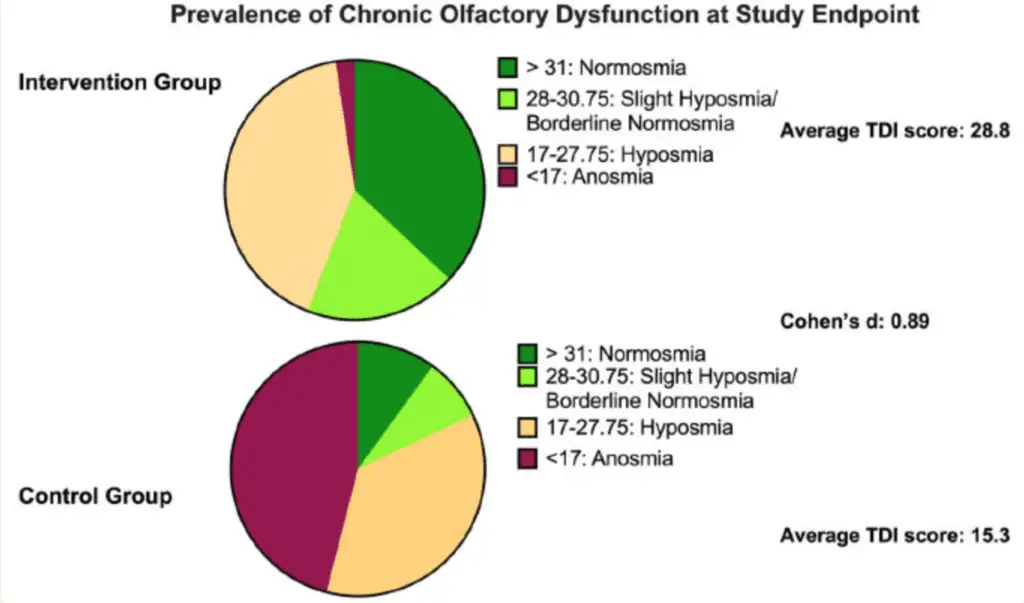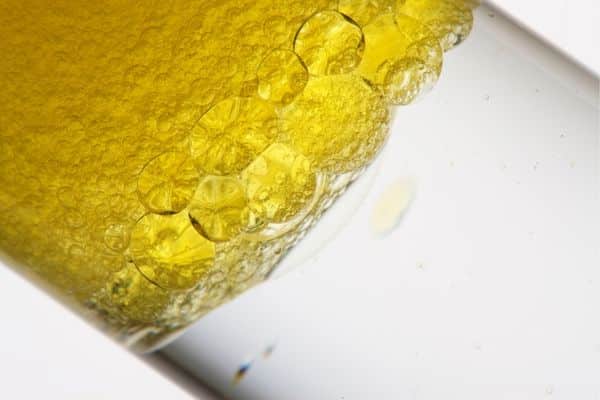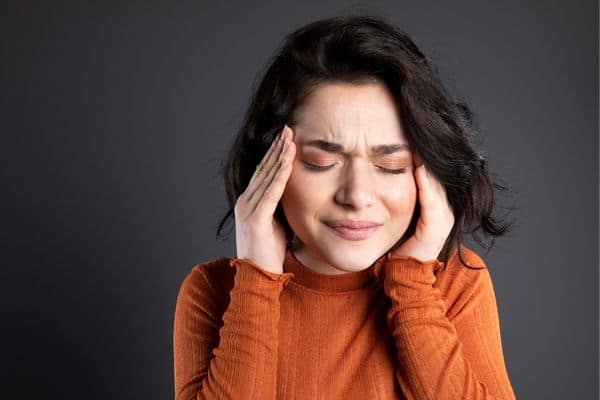A recent scientific article has shown that Luteolin added to smell therapy can help you regain your sense of smell after Covid.
New Treatment to Get Your Smell Back After Covid
Loss of Smell is a really common symptom of COVID infection, and for some people it does not return for months.
This loss of smell (called olfactory impairment or olfactory dysfunction) is a common symptom of COVID. And it really isn’t a small thing, about 10-20% of people who had covid have persistant loss of smell.
The current treatment is smell rehab, basically retraining your sense of smell with a specific smelling program. Which works for some people, but not everyone.

A new scientific study has shown that adding a Luteolin supplement to the rehab treatment significantly improved the return of sense of smell to patients who had Long-COVID Loss of smell.
Luteolin Helps You Regain Sense of Smell After COVID

Scientists looking at luteolin to help regain loss of smell after COVID first did one super small study from 2021 that was encouraging.
They followed this up with a well designed study (multicenter double-blinded randomized-clinical trial with 185 patients) and the results were very impressive. They treated people with PEA-Lut and olfactory training (the usual treatment for loss of smell), the control group got a placebo and the olfactory training.

So it was a good study design. The outcome was the ability to detect the odor on ‘Sniffin’ Sticks’ (which is an actual thing that scientists use to test the sense of smell, even if it sounds ridiculous.)
You can see in these graphs the ability to smell of people who got the treatment (the intervention group) compared to people who were treated with the smell therapy. The dark green is normal smell, light green is a slightly reduced ability to smell, yellow is a greatly reduced ability to smell, red is unable to smell at all.
It is important to realize that the ‘control group’ had the smell therapy treatment! It was considered unethical to not smell therapy as it is the current standard of treatment.
And almost half of people treated with just smell therapy still had no sense of smell! When people got smell therapy with the PEA-Lut supplement 92% got back their sense of smell.

The smelling score improved in 92% of people getting the PEA-Lut, but only in 42% of the people getting the placebo.
More than half (56%) of the people getting PEA-Lut recovered to a normal smelling score, but only 10% of those getting the placebo did.
These are really good results!
Does Luteolin Work on Smell That Has Been Lost for Months?
I think this study is super exciting, because as they point out ‘The observation of olfactory recovery in patients with olfactory loss in excess of 12 months suggests that some SARS-CoV-2 related injury is reversible long after acute illness has subsided.’
So basically, even if a long time has passed, there is hope for treating brain symptoms from COVID. And for anyone who is dealing with Long-COVID symptoms, that is exactly what you are hoping for.

Could there be even more improvement in smell? The study went for 90 days, and they wonder if more improvement could occur with more time, or with an increased dose of the PEA-Lut for those that did not fully recover their sense of smell.
Self Treat to Regain Sense of Smell After COVID
So you can actually do this at home, it isn’t a complicated treatment!
What was the treatment exactly? It was a daily treatment with PEA-LUT oral supplement and olfactory training for 3 months.
The supplement was one daily dose of PEA-LUT (Glialia brand, co-ultra-micronized PEA 700 mg and Luteolin 70 mg) 5-10 minutes before breakfast.
Then there was olfactory training (or smelling retraining therapy).
Basically this was smelling four 100% organic essences (Lemon, Rose, Eucalyptus and Cloves) three times a day.
The specific protocol was smelling an essence for 4-6 seconds, then 40 seconds of relaxation, and then, new stimulation for 4-6 seconds with another essence. Do this 3 times a day.
The reason to only smell for a few seconds was to avoid “saturation” of the olfactory receptors in the nose.
The experiment lasted 90 days. So people took luteolin and did this smell retraining every day for 90 days. They show how to do the smell retraining in this YouTube video.
So what do you need to try this yourself? You need a smell retraining kit and luteolin (PEA-Lut).
Smell Retraining Kit Option:
Luteolin Options:
Luteolin Also Treats ‘Weird Smell’ After COVID
Smelling things incorrectly is called parosmia, and many people with long-COVID complain of this.
Another study has looked at whether the PEA-Lut and smell therapy treatment could help with parosmia. The people in the study mainly complained of smelling onions, fish or meat incorrectly after having COVID.
In this study they looked at treatment with PEA-Lut and smell therapy, or just PEA-Lut. (Finally we can see what just PEA-Lut might do for loss of smell!)
But also added PEA-Lut to the treatment for people who had already been doing smell rehab (for an average of 8 1/2 months).
Again, PEA-Lut and the smell therapy helped. But most interestingly, adding PEA-Lut helped people who had already been doing the smell therapy for months! The researchers actually wondered if the anti-inflammatory action of PEA-Lut might be the most important part of the treatment.
They were so interested in the effect that PEA-Lut may have on COVID’s effect on the brain, they looked at the ‘mental clouding’ that about 40% of the patients had.
In this case they found that mental clouding improved somewhat with treatment, but the results indicated that the smell therapy and PEA-Lut worked better for mental clouding than just PEA-Lut alone!
What is Luteolin?
Luteolin is a bio-flavonoid found in different plants such as vegetables, medicinal herbs, and fruits.
Luteolin is a potent anti-inflammatory, luteolin can suppress cytokines which are linked to inflammation and chronic diseases like rheumatoid arthritis, asthma, atherosclerosis, Alzheimer’s disease and cancer.

Luteolin exists in many foods, particularly celery, spinach, artichoke, rooiboos tea, fenegreek seed and peppermint. I have a huge list of luteolin rich foods with how much luteolin they have in this post.
However Luteolin does not get absorbed through the gut very well. So taking Luteolin in a mixture with a fat seems to be important for absorption, and a form of luteolin called PEA-Lut is the best supplement for absorption.
What is PEA-Lut?
This study used PEA-Lut (brand name GLIALIA) – a form of Luteolin micronized with Palmitoylethanolamide (PEA).

Basically PEA-Lut is a special mix of luteolin and PEA, an oil. This mix is absorbed better by our intestine than just luteolin. (Read my post on Luteolin to see why this form may work better due to improved gut absorption).
Good news, these researchers had no conflict of interest, so they do not work for GLIALIA, or any other company that makes micronized PEA-Lut. So they were not biased to prove PEA-Lut was a better choice.
How Does Luteolin Help You Get Your Smell Back After COVID?
People showing this Post-COVID loss of smell are seen to have inflammation in their brain, with ‘microglial activation along olfactory pathways’ and they also had necrosis of the olfactory bulb.
So basically inflammation and cell death in the part of the brain that processes smell.

The researchers point out that if smell can improve after COVID, then the loss of smell is likely due to neuroinflammation and not total cell death.
That is really good news.
Can Luteolin Treat Other Long-COVID Symptoms?
You do have to wonder don’t you?
The study that showed improvement of ‘mental clouding’ with PEA-Lut and smell therapy is pretty interesting.
They thought is that PEA-Lut reduces inflammation in the brain, and the inflammation is the cause of long-COVID symptoms like continued problems with smell.
Another group looked at patients with fatigue and brain fog after COVID and found that they had alterations in the GABA neurotransmissions in the brain.
PEA-Lut treatment enhanced GABAB-ergic neurotransmission and cortical plasticity in the long Covid patients who took PEA-Lut (700mg/70mg) daily for 8 weeks. But there were no significant clinical changes in the fatigue or brain fog.

COVID Loss of Smell and Treatment: A Marker for Other Long-COVID Symptoms?
I think it makes sense that you probably don’t just get inflammation from COVID in just one specific part of the brain, like the part that you use to smell.
But, it is quite easy to notice when you lose your sense of smell vs whether you are having brain fog that makes it more difficult to solve problems or understand social interactions.
‘Mental clouding’ is not as quantifiable as not being able to smell something.
And, it also makes it much easier to study scientifically whether a treatment for smell works, because you can fairly easily study a person’s sense of smell, with those ‘Sniffin’ Sticks’.
So, it might be that loss of smell due to COVID may be a nice way to study treatments that could help with other neurological symptoms of COVID, like mental clouding, headache or dysautonomia.

I’ll be very interested to see more studies with Luteolin and long-COVID.
Luteolin Supplement to Treat COVID Loss of Smell
Interested in trying Luteolin? (Of course always get advice from your own health professional, this blog is not medical advice!)
Here are some options of where you can purchase:
These studies used PEA-Lut and the reason is that micronized PEA-Lut options should be absorbed a lot better than Luteolin alone. PEA-Lut is more expensive that luteolin, but it is likely worth the extra cost.
If you want a good micronized version of luteolin, Mirica is a reputable brand that has many micronised PEA-Lut options that have much higher absorption. (The Glialial brand used in the study seems to be available in Europe and is often sold out).
Luteolin Options from the Mirica Website:
- Mirica® Palmitoylethanolamide (PEA) and Luteolin
- Mirica® Advanced Palmitoylethanolamide (PEA) and Luteolin
- Mirica® Luteolin
Smelling Retraining Kit Options:
References
- Randomized clinical trial “olfactory dysfunction after COVID-19: olfactory rehabilitation therapy vs. intervention treatment with Palmitoylethanolamide and Luteolin”: preliminary results
- Ultramicronized Palmitoylethanolamide and Luteolin Supplement Combined with Olfactory Training to Treat Post-COVID-19 Olfactory Impairment: A Multi-Center Double-Blinded Randomized Placebo-Controlled Clinical Trial
- Effect of Ultra-Micronized Palmitoylethanolamide and Luteolin on Olfaction and Memory in Patients with Long COVID: Results of a Longitudinal Study
- Co-ultramicronized palmitoylethanolamide/luteolin normalizes GABAB-ergic activity and cortical plasticity in long COVID-19 syndrome
Great delivery. Solid arguments. Keep up the good work.